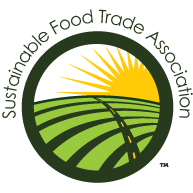Sustainable Food Trade Association
Organic leaders for sustainability
- Type:
- Agroecology
- Establishment year:
- 2008
- Categories:
- Organizations and Networks
- Keywords:
- General info
-
The Sustainable Food Trade Association is a non-profit organization. Our mission is to build the capacity of the organic food trade to transition to sustainable business models.
Our membership is comprised of a diverse mix of organic producers, processors, manufacturers, distributors and retailers, as well as related vendors, suppliers, aligned organizations and individuals. We believe that the organic sector must integrate environmentally sound, socially just business practices using a systems-based approach in order to reach its full potential. We support our members in implementing innovative sustainable business practices across the supply chain, from farm to retail. We seek members and partners who will join us in advocating for this meaningful change within the entire organic sector.
What We Do
We understand that the growth of the organic trade requires that the same values used to produce organic food and agricultural ingredients, and organic products be used in conducting the business of selling them. Implementing these sustainable practices can create strategic advantages, positive messaging and help to increase market share. SFTA assists its members to:
· Develop and evaluate their sustainability programs
· Set a sustainability strategy
· Benchmark current performance
· Collaboratively develop industry metrics
· Access reporting tools and templates specific to the organic sector
· Review of sustainability progress
· Innovate and promote best practices by providing
· Educational programs: webinars, workshops, consultations
· Promotional programs: articles, presentations, social media
· Access to member sustainability reports and case studies
· Learning communities and networking events
· Advocate for change within their businesses and in the organic food and farm sector
· Declaration of Sustainability
· Internal training programs
· Case studies to inform, inspire and stimulate research
· Action alerts
· Strategic partnerships with other associations and non-governmental organizations
Our History
In 2005, Organically Grown Company hosted a Sustainability Summit with growers, retailers, distributors and suppliers from the organic produce trade. The group set forth a challenge “What would our trade look like if we were sustainable?” and “Are we ready to take on this challenge?” Following the summit the businesses approached the Board of Resource Innovations, a program at the University of Oregon, about providing staff support to their network, in order to share best practices and work toward solutions for shared challenges. The group drafted the “Declaration of Sustainability in the Organic Food Trade” for use by the organic food trade as a framework for accomplishing the group’s goals. Over a period of three years (2005 through 2008) the 11-point action pledge was vetted with hundreds of organic growers, distributors, processors, retailers, certifiers and industry NGOs at numerous conferences across the country.
In July 2008, a group of 18 organic food companies formed the Food Trade Sustainability Leadership Association. The mission of the association was to build the capacity in “early adopter” businesses in the food supply chain, helping them transition toward innovative, environmentally and socially sustainable business models.
In February 2012, after four years of growth and industry recognition for its leadership in sustainability for the organic food trade, the association changed its name to the Sustainable Food Trade Association (SFTA.) The strategic decision to change the associations name was based on a desire to simplify the brand, which contributes to the growth of the organization. The mission of the organization is unchanged and remains committed to building the capacity of the organic food trade to transition to sustainable business models.
To accelerate change in the organic food sector SFTA partnered with B Lab in 2015 to provide a tool – the Quick Impact Assessment – that enables more companies to start measuring and reporting their environmental and social impacts. Ten questions specific to the organic trade were added to the B Lab assessment and will provide analytics that identify where the organic trade has positive impacts and where it needs additional support to reach its sustainable business goals.
In March 2016 membership was extended beyond organic food to include all businesses in the organic products sector and those that provide goods and services to businesses in the sector. The SFTA/B Lab Quick Impact Assessment is now a requirement of membership, expanding even further the participation of the organic trade in measuring what matters for a sustainability future.





Sustainable Food Trade Association
Organic leaders for sustainability